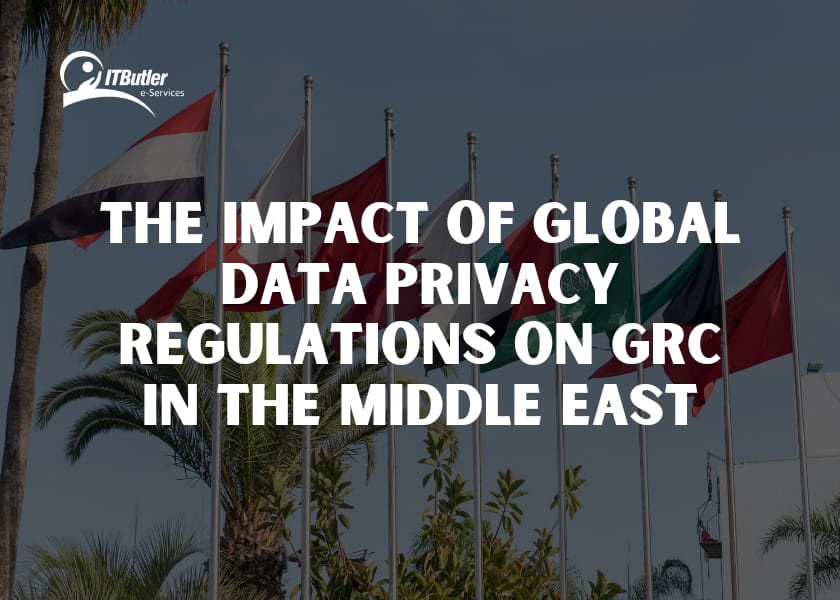Data privacy is just that like that tricky puzzle we all try to solve but end up scratching over our heads. With the rise of global data privacy regulations, it has become a booming topic for businesses in the Middle East. However, these regulations guarantee customer data safety and influence governance, risk management, and compliance (GRC). However, how do these regulations affect GRC practice in this region? Now let’s break this privacy puzzle and try to make some sense out of it all.
Global Data Privacy Regulations
Let’s take a quick tour of global data privacy regulations. However, everywhere in the world, countries are stepping up their game to protect personal data in a better way. Indeed, they are not playing around. Moreover, the best known of these is the General Data Protection Regulation (GDPR). This has its origin in the EU but it extends beyond the borders, all the way to the Middle East.
The GDPR protects personal data as if it were the cake at the office party, with care and respect. Then, there is CCPA, California Consumer Privacy Act, and PIPEDA, Personal Information Protection and Electronic Documents Act in Canada. They play a large role in teaching businesses how they should protect their data. However, they might differ slightly in their laws, but the mission is the same. All these laws share one overarching goal which is protecting personal information like gold.
How Global Data Privacy Laws Impact GRC in the Middle East
Now, let’s get into the details of how these global data privacy laws impact GRC in the Middle East.
Governance
The businesses of the Middle East need to relook at the governance structure on data privacy. Today, CEOs and boards can no longer sit back and hope things will work out. Instead, they must ensure that the company has new data privacy policies in place.
Consequently, this governance shift demands organizations to stay updated about global regulations. In addition, this development of local laws will also help to avoid fines, worse, or loss of trust.
Risk Management
Data flows are now being tracked like wild animals that do not wish to be caught by businesses. However, these are then subjected to massive amounts of fines due to the lack of meeting the GDPR standards. Especially when it comes to handling a customer’s data.
Therefore, Middle Eastern businesses are including privacy risks in their overall risk management frameworks to avoid breaches or regulatory failure.
Compliance
Compliance headache begins here. Organizations have to comply with the local Middle East privacy laws and, at the same time, address global rules. Consider that if an organization operating from UAE facilitates business for clients in the EU region. Then they have to comply with GDPR rules.
However, these compliance issues have made GRC professionals stay sharp and keep updating the policies, processes, and training.

Middle Eastern Perspective on Global Data Privacy
The Middle East remains an extremely curious market. Governments are still actively working on developing data privacy laws that suit the region, but it’s in a progressive phase.
For example, Saudi Arabia has shared its Personal Data Protection Law, which intends to safeguard the personal information of citizens. While the UAE has also rolled out its Federal Data Protection Law (FDPL).
Another example is the laws about data protection. This reflects the growing awareness of data protection but also gives companies another layer of complexity. As balancing GDPR with new local laws. Instead, it should be designed not to create a culture of privacy but to avoid paperwork, form-filling, and compliance work.
GDPR Compliance in the Middle East
Speaking about GDPR compliance feels like that strict teacher from high school who will hand over too much homework. However, it’s a must for Middle Eastern businesses that work with European customers to comply with standards set by GDPR.
However, explicit consent for data collection must be ensured. Moreover, data should be protected, and individuals must have an opportunity to exercise their rights. For example, the right to access or delete their information.
For most businesses, being compliant with GDPR leads to an endless to-do list but it must be checked off. Because it ensures companies keep their data-handling practices in check, so they don’t have to face future headaches. Moreover, when customers know that their data is in safe hands, their trust builds for the long term.
Effect of Data Privacy Laws on Risk Management
Let’s not forget the effect of global data privacy laws that spread across risk management in the Middle East. However, there is increasing pressure and regulation that forces companies to look into their respective risks. Thus, they review their processes and technologies to ensure they are safe.
Businesses should be aware of their weakness in data privacy, and how to patch it up. Moreover, there is a need to review cybersecurity actions constantly. Furthermore, middle Eastern firms are also investing in data encryption, regular audits, and training of staff on privacy. Indeed, a secure system is good when the who are people managing it, are the best.
Cross-Border Data Transfers
Several major challenges face Middle Eastern companies when it comes to cross-border data transfers. If an organization in the UAE is mandated to transfer data from a server located in Europe or the US. It will have to comply with all legal rules attached to the task. However, it’s like sending a precious package across borders, ensuring that it does not get lost or tampered with.
Most global global privacy laws, including the GDPR, are strict about cross-border data transfers. In this regard, the companies must establish a proper agreement. For example, standard contractual clauses, to ensure safe and lawful data transfer. Otherwise, they may suffer penalties from both local and global regulators.
Future of Data Privacy in the Middle East
So what does the future hold for data privacy in the Middle East? Bright, but a little bumpy. However, when Middle Eastern countries roll out their privacy regulations, businesses will only be making adjustments. But companies that stay proactive in their GRC efforts won’t just avoid fines, they will also build relationships with customers.
Moreover, automated compliance solutions, safer data transfer methods, and regional laws are to be expected in the future. Companies will then finally be able to manage local and international expectations for privacy.
Conclusion
While this whole global data privacy for businesses may seem daunting. But the basis of it all comes down to treating information about persons with respect and attention. In the Middle East, this has become a prime issue, and firms are reshaping their GRC frameworks to stay ahead. In this way, businesses will set up a solid trust, and avoid costly fines.
But whereas regulations on global data privacy might make it look like an obstacle for businesses in the Middle East. However, the correct approach allows those firms to cross the finish line with ease.
FAQs about Global Data Privacy Laws
-Does GDPR apply to Saudi Arabia?
Yes, the GDPR applies to businesses in Saudi Arabia if they process the personal data of individuals in the EU. Without considering where the business is located.
-Is there GDPR in the Middle East?
Although there isn’t a specific GDPR for the Middle East. However, Saudi Arabia and the UAE, have formulated their laws on data privacy, inspired by global standards. Most of these laws are concerned with and kept in line with international privacy practices designed to protect personal data.
-Which countries do not follow GDPR?
Here is the list of European Countries that don’t follow GDPR:
- Albania.
- Belarus.
- Bosnia and Herzegovina.
- Kosovo.
- Moldovia.
- Montenegro.
- North Macedonia.
- Russi





